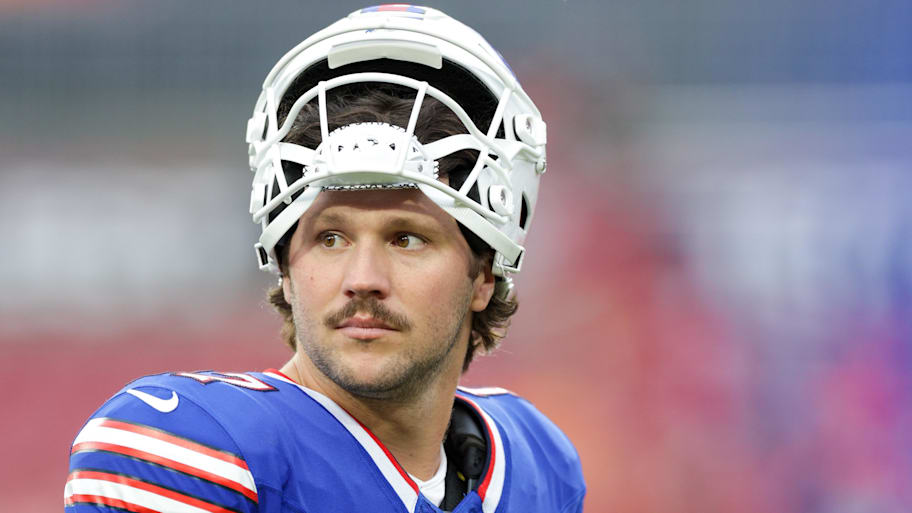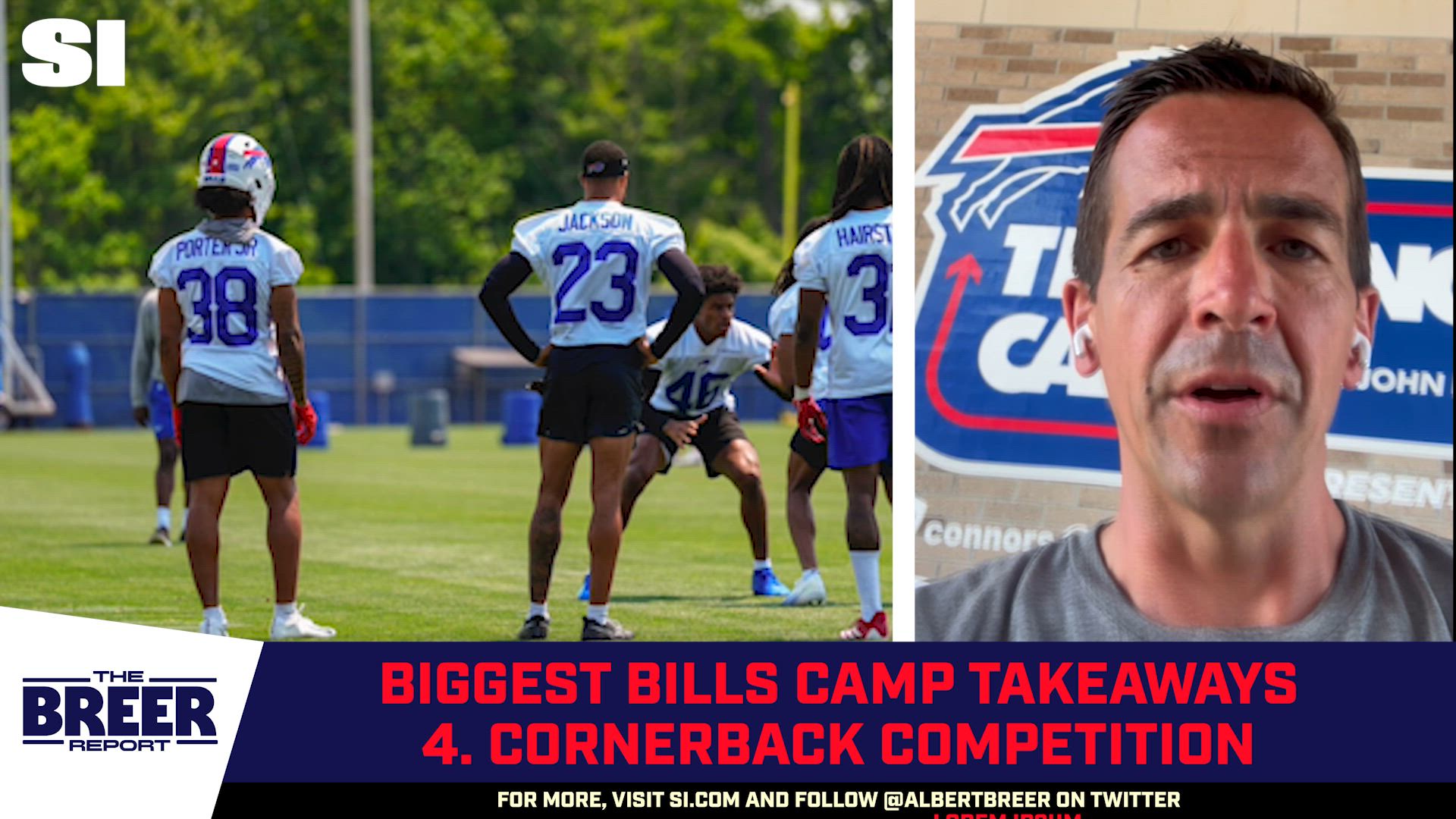
ROCHESTER, N.Y . — Josh Allen isn’t old.
But, in an NFL context, there are signs of age starting to creep up, slowly and subtly.
“We got Joe Andreessen last year, and the whole thing was like he was wearing 17 jerseys years back—he’s from Buffalo,” Allen told me in a quiet moment, maybe 50 yards away, and behind a set of stands, from where he’d just practiced. “I mean, it’s starting to get there. I’ve had a couple of teammates come up to me and be like, Man I’ve used you in Madden forever. Things like that. But those are still few and far between.”
For everyone here, there’s a little bit of a sobering feeling to the idea that Allen will turn 30 in March. It’s a reminder for Sean McDermott and Brandon Beane of how long they’ve been running the Bills. It can also have a way of ratcheting up the angst of long-suffering fans, who know how special what they have in Allen is, and how excruciating it can be to get so close to the NFL’s apex without actually planting your flag on the peak.
For Allen himself, it’s created motivation to make sure he’s at his best now and stays there for a long time to come.
The 29-year-old is self-aware, too. As a bigger quarterback who’s never shied from contact, the history is what it is. Cam Newton last played a full season in 2017, at 28 years old, and wasn’t the same after 30. Ben Roethlisberger re-engineered his game at 30 in ’12 when Todd Haley arrived in Pittsburgh as coordinator. From that point forward, Roethlisberger averaged fewer than two runs per game (1.64, to be exact) and took fewer sacks (he absorbed 40 sacks in five of his first eight seasons, then only once in his final 10 seasons).
In just about every way, Allen is pursuing one outcome and trying to avoid another, even if those examples aren’t perfect comps when it comes to play style or circumstance. That means for the NFL’s reigning MVP, an all-encompassing dive into building toward an encore to a career year, and one, just as important, that’s very intentionally sustainable.
With the hope, of course, that he and the Bills find a way to take the next step this year, and again and again and again after that.
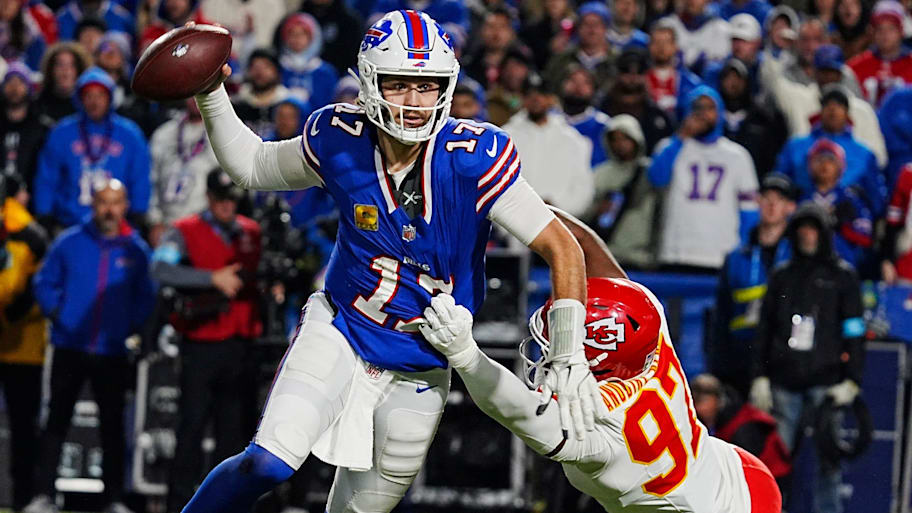
‘My game will have to evolve’
As Allen has grown as a passer and a player, the Bills have worked on trying to limit the damage to a player who came into a grown man’s version of a violent game as a battering ram of an offensive weapon. Over time, they’ve coached Allen to know when to slide or give up on a play, and when to put his shoulder down vs. when to get down, while play-calling more judiciously to keep their quarterback out of harm’s way.
The improvement in those areas hasn’t been so statistically evident—while he did average a career-low 6.0 carries per game last year, that number wasn’t massively lower than it had been in previous years. The eye test, though, would show you a noticeable difference. The result of that eye test checks out with how he feels going into the 2025 season.
The change should have an impact on his longevity, or at least that’s the idea.
Allen knows his freakish athleticism won’t last forever. A point will come when he has to evolve and become more reliant on his ability to win from the pocket, which has come a long way over the seven years since he was the No. 7 selection in the 2018 draft.
“And I think last year was a step in the right direction, where I didn’t take too many hits. I’m not saying I didn’t take any. But during this offseason? This is the best I’ve felt after any season because I didn’t take hits.”Josh Allen
“I think about it a lot; eventually my game will have to evolve,” he says. “And I think last year was a step in the right direction, where I didn’t take too many hits. I’m not saying I didn’t take any. But during this offseason? This is the best I’ve felt after any season because I didn’t take hits.”
That sounded wild, given that he is already seven seasons in, and the damage for an NFL player is usually cumulative, based on games and seasons played.
“Yeah,” he says. “But, again, it’s just being smarter, sliding, getting out of bounds, and throwing the ball away a little bit quicker and not taking these extra one or two hits a game that start adding up,”
Another byproduct of that approach is a more complete player.
Coming out, Allen was seen as a wild-bronco of a prospect—a horse needing to be broken and rebuilt. So when he arrived in Buffalo, learning the big-picture quarterback stuff was front and center for him.
With that now in the rear-view mirror, and his talent harnessed, Allen can dive into the details to make incremental progress, the way a lot of the best quarterbacks do when they get into their thirties (and in some exceptional cases, forties). This offseason, for Allen, that meant drilling keeping his base wide, and refining his throwing form/rotation.
“I was getting a little funkier with my mechanics last year, and that’s a shoulder, an elbow here and there,” he says. “You’re just trying to tweak things and survive as the year goes by, just trying to figure it out. But having a whole offseason to understand what my body is doing, and trying to do it right, and, yeah, just making sure mechanically I’m as sound as possible.”
That he’s down to that level of fine-tuning is apparent on the practice field already in how easy everything now looks for him and, by extension, the Bills offense. It’s also, again, a sign of just how far he’s come and evolved.
It’s something Allen thought about earlier in the summer, when he came across an old Bruce Lee clip that resonated with him.
“The master is asking, What technique are you thinking about?” Allen recalls. “And he’s like, I’m not thinking about a technique. So it’s getting to that point where it is not a technique. It’s something that just … it’s autonomously happening. And still trying to rep these drills and understanding—wide base, get my left foot open, keep my left shoulder closed, and turn through it—and eventually at some point it becomes muscle memory and I won’t even have to worry about it.”
Important, too, because Allen knows, as he gets older, he’ll have plenty of other things to concern himself with.
Working on his phone hygiene
So here’s a change by Allen that everyone can relate to: He’s forced himself to put his phone down 30 minutes before his target bedtime. During camp, he’s tried to fall asleep as soon as he can after the Bills’ 10:30 p.m. curfew. So that means no texting, scrolling or calling after he goes to bed.
“So we have to be in our room at 10:30,” he says. “Now, obviously, when you get to your room at 10:30, it’s going to take you probably 30 minutes to fall asleep. But limiting the blue-light exposure to the eyes—stop staring at your screen, and just put it away—helps. Scrolling on your phone while you’re lying down, I think that adds a few more minutes of you being up for no reason.”
Which is just an example of how, yes, Allen’s becoming conscientious about everything.
“I’m trying to get at least eight [hours],” he continues. “Some nights, like, on off days, I’ve been getting more. I’ve been wearing a sleep-tracker, and last off day I got about 10 hours of sleep, which was great.”
Allen also hired a chef to make meals for him two nights a week, and he’s cut back on sugar and dairy—“That’s still a process,” he says, “I’m learning about and getting into what’s better for my body.”
These changes are, of course, not so much to address problems that exist now, but to ward off what looms ahead for any pro athlete at Allen’s age. The concept, which Allen embraced in earnest last year, is to work on how everything he does outside the building affects him in the same way he’s attacked the work he’s done inside the building since 2018.
Which brings you back to longevity. Allen won’t say precisely how much longer he wants to play—he’s at the age when Tom Brady started talking about playing into his 40s—but it’s clear that, in his view, if his career were a round of golf, he wouldn’t yet be at the turn.
“I think about it often,” he says. “I think about it within my diet, going back to last year, being smarter with what I am putting into my body—more massage, more red-light [therapy], more rehab.”
Part of that grander scheme of things, too, is his place in the locker room and organization.
That’s changed as well.
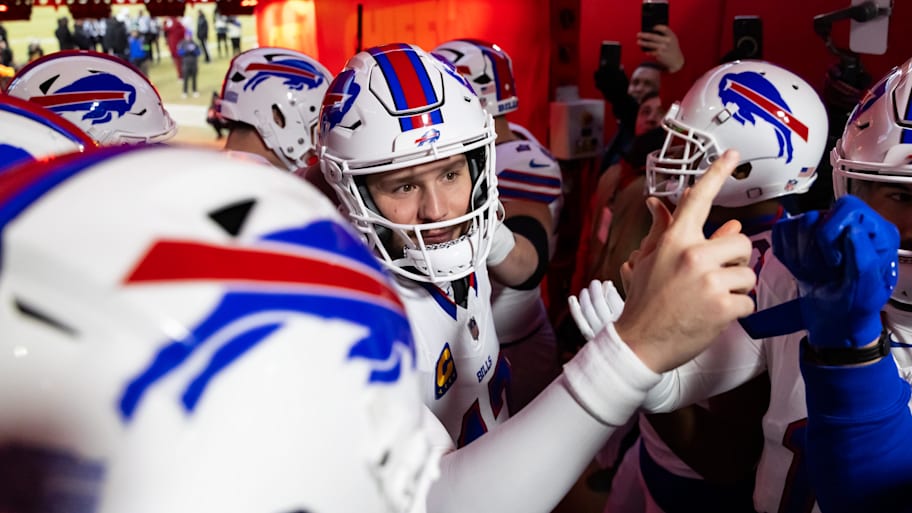
Becoming an elder statesman
The first place where Allen is starting to feel the generation gap with teammates—21-year-old rookie Deone Walker, for example, was in the eighth grade when he was drafted—is a familiar one among most quarterbacks when they approach 30.
There’s also music. At practice, in the locker room, and on his teammates’ playlists, there’s plenty Allen doesn’t know. So he makes the effort to meet them where they are.
“You want to show your age and be mature and be the quarterback of the team, and you start getting closer in age to coaches than you do to younger teammates,” Allen says. “But at the same time, you want to be one of the guys. And there’s a delicate balance you have to teeter in between, and I feel like I do a good job at that just because I have fun at work. I love what I do, and it’s easy to relate to some of the young guys on that.
“As they get younger, though, it is getting a little harder. The stuff that they watch, the stuff that they listen to, the stuff they grew up doing is just a little bit different. But, yeah, it’s a delicate balance between being the guy and being one of the guys.”
There’s a responsibility that comes with it, too.
When Allen arrived in Buffalo, there were guys such as LeSean McCoy, Kyle Williams, Star Lotulelei, Lorenzo Alexander, Jordan Poyer and Micah Hyde on the roster. Early on, it was on them to help McDermott and Beane establish a program that would turn the Titanic—the year before Allen got there, McDermott’s first, the Bills made the playoffs for the first time in 18 years.
Now, he knows, it’s his time to carry the torch, which he’s embraced.
“I try to simplify it, and really the only responsibility I have is, one, to work as hard as I can,” Allen says. “And I want people to see it. I want my teammates to understand that I am still trying to get better. And then two, to treat not only the guys in the locker room, but everyone in our facility right. That’s the cafeteria, that’s the mail room, that’s the training room and that’s the strength staff. Whatever it is, everyone is important to the success of the organization from the top to the bottom. And we preach a lot of love in this locker room.”
Allen then adds, “Honestly, I take it as such a sign of respect when guys leave and come back and are like, There’s no place like this locker room. It’s just different here.”
The quarterback also takes pride in seeing that torch passed to other guys, this being very much the second phase of the Allen era, with the players above. Others such as Stefon Diggs and Tre’Davious White are gone, and Greg Rousseau, Terrel Bernard, Christian Benford, Khalil Shakir and James Cook now paid, with a few, such as Ed Oliver, Dawson Knox and Dion Dawkins, bridging the two groups that Allen has won with.
It’s on everyone to maintain it. Which, of course, starts with Allen himself.
“I think honestly one of my greatest strengths is being authentic and being myself, but also being able to talk to people in a way where I understand where they are coming from,” he continued. “I think that comes from my background of being a farmer from a small town, living in a predominantly Hispanic community, going to smaller schools. And then getting here. I know people from every different walk of life, and I’ve loved all my teammates … I know how to talk to guys in an authentic way—because it actually is.”
Of course, that’s easier when your play is too.
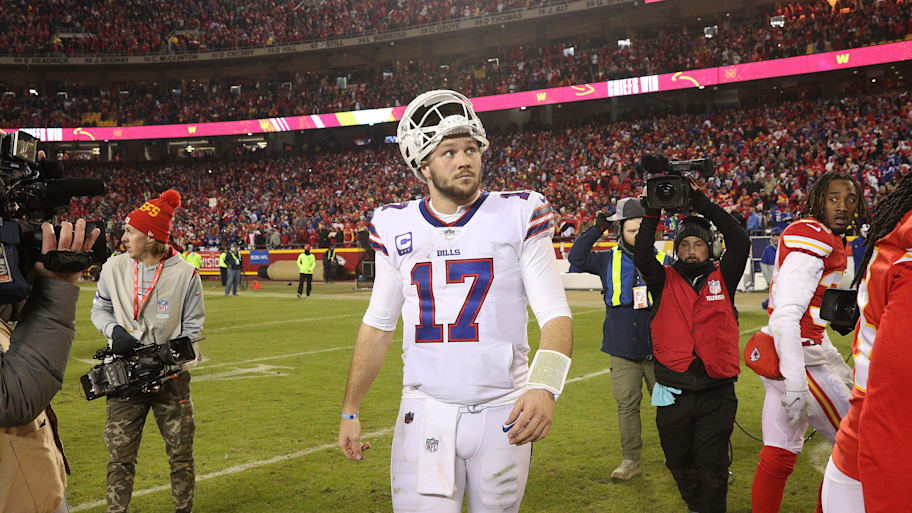
Getting the Bills over the top
There was a play last year against the Colts in Week 10. With 16 seconds left in the first quarter, Buffalo was up 10–3, facing third-and-3 at the Indy 28. At the snap, Allen opened up to his right and looked to Curtis Samuel in the flat, saw him covered, and found a wide-open Dalton Kincaid streaking down the seam wide open.
Allen’s eyes got wide, and he put too much on the ball, sailing it way over Kincaid’s head. While the Bills went for it, and failed to convert on fourth down, and Indy wound up taking a 13–10 lead, Buffalo took control by halftime and cruised to a 30–20 win.
For most guys, it’d be a forgotten play in an MVP season. For Allen, it wasn’t.
“It would’ve been a laugher,” says Allen, implying Kincaid had an easy touchdown (which he did). “And I feel so bad, because I missed Dalton more than anyone last year, and I wish people would see that and say Josh needs to be better for Dalton, not the other way around. He’s such a stud; I’ve got so much faith in him. But, again, I’m still trying to get better.”
And he’s using plays like that one in picking apart his 2024 tape.
“There are still so many things I can grow from, mainly with my eyes and my feet,” Allen says. “I’m still working mechanically and trying to be as sound as possible. But, looking back at the tape last year, there were four or five touchdowns that I missed, which would have been walk-ins. They could have helped us and put us in a better situation.”
But he also has his teammates’ backs. And that’s in large part in appreciation of what’s been built in Buffalo, and what Allen has at his disposal—organizationally, in coaching and, most of all, with his teammates.
So when you sit down with him, the confidence he has that the Bills’ next shot at a title will bring a different result is identifiable and genuine. When asked what it’ll take to get his team over the top, he answers, “Not letting the past impact us.” When I prodded him to go deeper, he revealed a belief that the proper steps have been taken already.
“If we keep putting our heads down,” Allen says, “keep knocking at the door, the door is going to open eventually.”
And when it does?
Allen smiles—“The only thing I can think of is I get the chills just thinking about it. God’s timing is always right.”
A lot of other things are right in Buffalo, too.
And, if Allen has a say, it’ll stay that way for a long time.
This article was originally published on www.si.com as What Josh Allen Is Doing to Get the Bills That Elusive Super Bowl Win.
